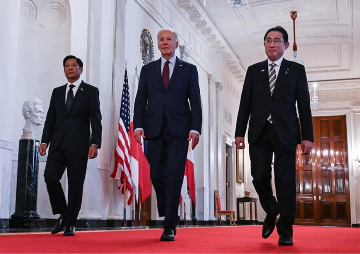 This article is part of ORF's Research and Analyses on the unfolding situation in Afghanistan since August 15, 2021.
This article is part of ORF's Research and Analyses on the unfolding situation in Afghanistan since August 15, 2021.
Sri Lankan Prime Minister Mahinda Rajapaksa tweeted on 18 August 2021 that he had spoken to the former President of Afghanistan, Hamid Karzai, “to inquire about the ongoing developments unfolding in his country and reaffirmed #SriLanka’s continued support to the People of Afghanistan.” Sri Lankan Media Minister and Cabinet Spokesperson, Dullas Alahapperuma, has since said that President Gotabaya Rajapaksa has directed the Foreign Ministry to discuss the situation in Afghanistan and to announce Sri Lanka’s stand on it. Alahapperuma added that Sri Lanka was saddened by the plight of the Afghan people with so many trying to leave the country.
The Foreign Ministry released a statement on 21 August 2021, maintaining that the Government of Sri Lanka was “deeply concerned” and “closely monitoring developments”, emphasising that their primary concern was the safety and security of Sri Lankans living in Afghanistan and evacuating them to safety or back to Sri Lanka. It also stated that Foreign Minister Prof GL Peiris was meeting relevant envoys and requesting their assistance for Sri Lankans in Afghanistan. Further, Prime Minister Mahinda Rajapaksa has met with the Afghan Ambassador to Sri Lanka, M. Ashraf Haidari, and offered “full support” to the embassy in Colombo. Ambassador designate of Sri Lanka to Iran, Wishwanath Aponsu, called on the Iranian Minister of Foreign Affairs on 1 September 2021 in Tehran. While this was simply a courtesy call, in the current geopolitical climate, when the entire world is waiting, watching, and assessing the situation in Afghanistan, any engagement between countries in the region becomes relevant.
Alahapperuma added that Sri Lanka was saddened by the plight of the Afghan people with so many trying to leave the country.
Sri Lanka, in the statement that it released recently, notes specific aspects of the developing situation in Afghanistan that the government found reassuring, namely two points: (i) The Government of Sri Lanka is happy to note that the Taliban has offered an amnesty and promised not to harm any foreigners and requests the Taliban to continue honouring that commitment (ii) The Government of Sri Lanka is also happy to see the pledges given by the Taliban that the women in Afghanistan can work and girls can go to school, following the Islamic tradition.
Maldivian response to the Taliban takeover
India’s other island neighbour, Maldives, has yet to make an official statement. Maldivian Foreign Minister Abdulla Shahid, following the terrorist attack at Kabul airport, tweeted, “Strongly condemn the deadly terrorist attack,” adding that the world must unite against terrorism and stand with the people of Afghanistan. Minister Shahid in his role as President of UN General Assembly (UNGA) has previously said that the UN has “a very clear role in what is happening in Afghanistan,” while also asserting that, “The people of Afghanistan are resilient and their government is democratic. We in the international community should help the Afghan people in whatever way they so desire.” However, the question of, ‘What do the Afghan people desire?’, cannot be easily answered.
The Government of Sri Lanka is happy to note that the Taliban has offered an amnesty and promised not to harm any foreigners and requests the Taliban to continue honouring that commitment
Much like many other leaders across the world, disturbed and unsure of the evolving situation, it appears both Sri Lankan and Maldivian leaders too are closely watching the events as they unfold, not rushing to recognise or alternatively reject the Taliban administration, but are simply registering their concerns. Though, perhaps, not fully and formally articulated in official statements or by members of the government, their larger concerns, however, are easy enough to understand. There are major threats arising from the Af-Pak region in the aftermath of the chaotic US withdrawal that could affect Sri Lanka and Maldives that need to be considered.
Threat of terrorism and regional insecurity
The Sri Lankan government has stated its concerns over “extremist religious elements attempting to find a safe haven and enhanced illegal narcotic trade, which can have a destabilising effect on the entire South Asian region.” Foreign Minister Shahid has also previously argued that Afghanistan’s security is a matter of concern for all its immediate South Asian neighbours. However, it is the former Sri Lankan Prime Minister Ranil Wickremesinghe and former President of Maldives Mohammed Nasheed who have been particularly vocal in their concerns. Wickremesinghe cautioned Sri Lanka against recognising Taliban rule in Afghanistan, pointing out that, “Everyone fears that Afghanistan would become a centre of jihadi terrorist groups under the Taliban rule.” The former Head of NATO, George Robertson has similarly warned that the Taliban’s return will attract “a whole host of jihadists” from other countries—who could ultimately strike elsewhere.
Everyone fears that Afghanistan would become a centre of jihadi terrorist groups under the Taliban rule.
For Sri Lanka, given its own recent encounter with terrorism vis-à-vis the Easter bombings in 2019 as well as the lurid memory of the attack on the Buddha statues in the valley of Bamiyan in Central Afghanistan by the Taliban in 2001, the potential threat of rising terrorism is a very real and worrying one. Similarly, the Ibrahim Solih government in Maldives has been tackling rising radicalism since it came into power in 2018, through institutional and legal reforms as well as through re-education programmes, awareness and support from the UN on counterterrorism projects. However, the recent attack on former President Nasheed and the incident of government-owned boats being set on fire, along with Maldives’ worrying statistic of having the highest per capita rates of jihadists who have left to fight in Iraq and Syria, highlight the ongoing nature and threat of extremism in the archipelago nation. Given the current situation in Afghanistan with all its potential to give way to greater chaos and instability, the threat of rising terrorism in the South Asian neighbourhood must be an especially alarming prospect for these island nations.
Regional integration and connectivity: Perennially on pause in South Asia
For small island nations that are naturally and physically cut off from the rest of the world, integration and connectivity are important goals for economic development. The Sri Lankan economy, which is currently in midst of an economic crisis finds itself less integrated now than it was in the 1950s. India’s smaller island neighbours would ideally like to revive South Asia’s moribund regional integration project SAARC. While they were willing to bypass India-Pakistan hostility through efforts at sub-regionalism, such as SASEC and BIMSTEC, they often state their preference for SAARC. Back in February 2020, on his first visit to India after becoming the Prime Minister, Mahinda Rajapaksa said in an interview, “I do believe that we have already gone a considerable distance with building SAARC and that should be continued.” Sri Lanka’s statement on Afghanistan contained an interesting though oblique reference to SAARC: “As a member of SAARC, Sri Lanka is prepared to play its role to assist any regional efforts in this regard.” If SAARC had little hope of reviving itself earlier due to India-Pakistan rivalry, in the current climate, it looks wholly unimaginable. However, the return of Taliban to power in Afghanistan, along with much else, will also change the dynamics of South Asian regionalism, which has frequently and long been on pause. Sri Lanka has been looking to increase ties with Afghanistan having recently signed Memorandums of Understanding (MoUs) and held discussions on the high potential for bilateral trade, particularly in tea, gems and jewellery, dried fruit, nuts and cereals as well as air connectivity for closer cooperation in tourism. It will be interesting to see what alternatives Sri Lanka (and other smaller nations like them) might consider, and more importantly, whether they will look to China to find their foothold in the newly emerging geopolitical landscape of Afghanistan.
The return of Taliban to power in Afghanistan, along with much else, will also change the dynamics of South Asian regionalism, which has frequently and long been on pause.
Is a new Cold War emerging?
There is a tendency to see every move on the international stage as a step towards the world splitting into separate two blocs, in this case on two sides of the political crisis in Afghanistan. Though it is too soon to tell, Russia and China, along with Pakistan and Iran, appear ready to step into the vacuum left behind by the US. They could potentially emerge as a bloc with considerable clout in the region. However, as the situation unfolds every day in Afghanistan and as the Taliban prepare to take on a role of governance, there is a decided and perceptible caution that has crept in, on the part of all countries wanting to engage with Afghanistan, including Russia and China. The initial positive rhetoric coming out of the Russian embassy, with the Russian ambassador claiming the situation in Kabul under the Taliban is better than it was under the Ghani government, has given way to caution and reserve. Russian President Vladimir Putin speaking at a plenary session at the Eastern Economic Forum in Vladivostok has been tempered as he said he hopes the Taliban will behave in a “civilised” manner in Afghanistan.
The whole world is watching, quietly, cautiously, tensely, as a humanitarian crisis of potentially disastrous proportions and countless repercussions loom large in the imminent future. As India takes stock of the situation, its focus must also remain on its island neighbours, their concerns, potential choices, and the newly emerging alternatives presenting itself to them. If, indeed, a new kind of cold war is emerging, India must consider which way its immediate neighbours will go: Maldives with its Defence Cooperation deal with the US and Sri Lanka with its huge infra-investments with China, both suffering from the adverse effects of the pandemic, economic disintegration, and reduced global travel begs the question: Which way will they go? Though it may be hypothetical, it is still an important question for India to contemplate.
The views expressed above belong to the author(s). ORF research and analyses now available on Telegram! Click here to access our curated content — blogs, longforms and interviews.



 This article is part of ORF's
This article is part of ORF's  PREV
PREV


